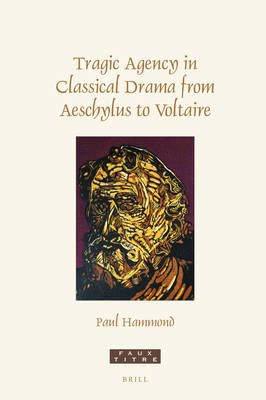
- Afhalen na 1 uur in een winkel met voorraad
- Gratis thuislevering in België vanaf € 30
- Ruim aanbod met 7 miljoen producten
- Afhalen na 1 uur in een winkel met voorraad
- Gratis thuislevering in België vanaf € 30
- Ruim aanbod met 7 miljoen producten
Zoeken
Omschrijving
Are we free agents? This perennial question is addressed by tragedy when it dramatizes the struggle of individuals with supernatural forces, or maps the inner conflict of a mind divided against itself.
The first part of this book follows the adaptations of four myths as they migrate from classical Greek tragedy to Seneca and on to seventeenth-century France: the stories of Agamemnon, Oedipus, Medea, and Phaedra. Detailed linguistic analysis charts the playwrights' contrasting assumptions about agency and autonomy. In the second part, six plays by Corneille and Racine are discussed to show how the problem of agency and free will is explored in scenarios which show protagonists who are in thrall to their past, to their rulers, or to their own ideals.
The first part of this book follows the adaptations of four myths as they migrate from classical Greek tragedy to Seneca and on to seventeenth-century France: the stories of Agamemnon, Oedipus, Medea, and Phaedra. Detailed linguistic analysis charts the playwrights' contrasting assumptions about agency and autonomy. In the second part, six plays by Corneille and Racine are discussed to show how the problem of agency and free will is explored in scenarios which show protagonists who are in thrall to their past, to their rulers, or to their own ideals.
Specificaties
Betrokkenen
- Auteur(s):
- Uitgeverij:
Inhoud
- Aantal bladzijden:
- 388
- Taal:
- Engels
- Reeks:
- Reeksnummer:
- nr. 451
Eigenschappen
- Productcode (EAN):
- 9789004467019
- Verschijningsdatum:
- 21/10/2021
- Uitvoering:
- Hardcover
- Formaat:
- Genaaid
- Afmetingen:
- 155 mm x 235 mm
- Gewicht:
- 771 g

Alleen bij Standaard Boekhandel
+ 473 punten op je klantenkaart van Standaard Boekhandel
Beoordelingen
We publiceren alleen reviews die voldoen aan de voorwaarden voor reviews. Bekijk onze voorwaarden voor reviews.








